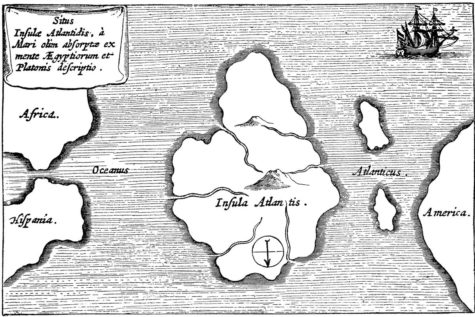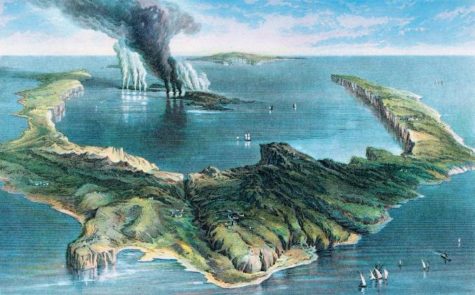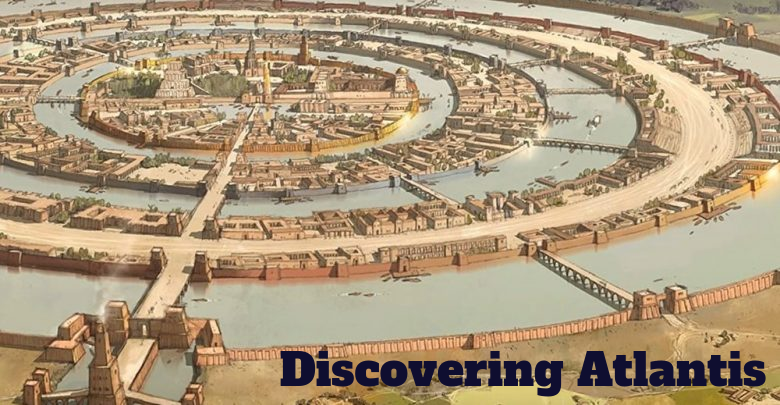Discovering Atlantis
October 11, 2019
Many historians and average Joes alike would say that Atlantis is only a myth. That it is only a cautionary tale created by Plato to preach philosophy, and that its only purpose was to show the flaws in trying to reach god-like perfection. In any case, the mystery of Atlantis has been the subject of research and scrutiny for thousands of years, and in this time, there have been many theories and explanations given to this ancient conundrum.
 To fully understand the lore and backstory of this enigmatic mystery, we must go thousands of years to the year 360 BC, the first recorded reference to Atlantis. At this time, the now venerated philosopher Plato published the infamous dialogues Timaeus and Critias, and sprinkled throughout the passages is the story of the city of Atlantis. In his dialogues, Atlantis is described as a large island that was ruled by a powerful king and home to a thriving civilization. The island itself was partitioned into a large center isle with concentric rings of land surrounding it, contained within were buildings made of red, white, and black rocks.
To fully understand the lore and backstory of this enigmatic mystery, we must go thousands of years to the year 360 BC, the first recorded reference to Atlantis. At this time, the now venerated philosopher Plato published the infamous dialogues Timaeus and Critias, and sprinkled throughout the passages is the story of the city of Atlantis. In his dialogues, Atlantis is described as a large island that was ruled by a powerful king and home to a thriving civilization. The island itself was partitioned into a large center isle with concentric rings of land surrounding it, contained within were buildings made of red, white, and black rocks.
Although Plato is considered the first and only concrete piece of evidence of Atlantis’ existence, countless others have written about it. The logographer Hellanicus of Lesbos was a prolific and influential historian of his time with much of his work sadly lost to history. One of these lost works was called Atlantis, which is about the descendants of the Titan Atlas, and it is believed that Plato may have included pieces of this work in his own. Furthermore it is speculated that Hellanicus may have gathered his information from an earlier poem with the same name.
The philosopher Crantor, a student of a student of Plato, believed the tale of Atlantis to be fact. Evidence from another author, Timaeus, strengthens the idea that Atlantis was a real historical place. Although his commentary is lost, a work of a later philosopher survives that mentions it. In his recollection, it says when Crantor went to visit Egypt, he saw hieroglyphics and talked to priests to confirm that Atlantis was a historical reality. In any case, the tale of Atlantis has been around for centuries, but the idea it has been a real place has been much more modern. 
The idea that Atlantis was an actual location and not a myth invented by Plato was popularized in the late 19th century by the writer Ignatius Donnelly. He argued that the accomplishments of the ancient world must have been passed down by an earlier advanced civilization, since they themselves would not have the knowledge or power to complete such tasks. Donnelly also popularized the belief that the continent or land mass that was Atlantis sank to the bottom of the Atlantic ocean just outside the Pillars of Hercules, which refers to the entrance of the strait of Gibraltar.
Obviously, other theories regarding the fate of Atlantis exist, with all of them ranging in various degrees of scientific backing and/or proof. In the 1970’s, a well-known writer suggested that Atlantis fell victim to the notorious Bermuda Triangle, with people citing underwater structures and walls off the Bahamas as proof. Other theories suggest that the city of Atlantis itself is nothing but a myth, but the story is actually based off of real life events. The two historical events most associated with the historical basis of Atlantis are the Black Sea Flood and the destruction of the Minoan civilization. 
The Black Sea Flood was an event that happened around 5600 BC, when the Mediterranean Sea burst through the Strait of Istanbul to the Black Sea, which at the time was a freshwater lake half its current size. This led to widespread flooding as hundreds of feet of saltwater surged onto the land. The destruction of the Minoan civilization is another historical phenomenon that has haunted scientists and historians for centuries.
The Minonans were a powerful civilization that built massive cities and were the first Europeans to use a written language, but at the height of their power, they inexplicably vanished. A new theory regarding the fate of the Minoans suggests that in 1600 BC a massive earthquake caused a volcanic eruption on their home island of Thera, which lead to Tsunamis and enough destruction to wipe their civilization off the map. The similarities between the Minoan civilization and sudden disappearance of Atlantis has led many to believe he mythical tale and their disappearance is one in the same.
In the end, the existence of the city of Atlantis is hotly debated and has been the source of pseudoscience and speculation for decades, and it doesn’t look like the centuries-long debate will end any time soon. Maybe Atlantis was a real city now lost forever at the bottom of the Atlantic Ocean. Maybe Atlantis was actually a Minonan city, or town lost to the Black Sea. New technology and discovery are revealing secrets of the ancient world every day. Perhaps, like the ancient city of Troy that was once thought to be a myth, new evidence will prove the existence of a historical Atlantis. Whatever the case may be, the mystery of Atlantis continues to fascinate historians and history enthusiasts into the 21st century.





